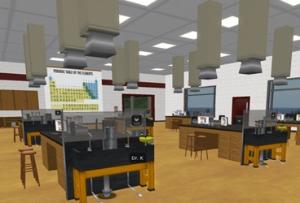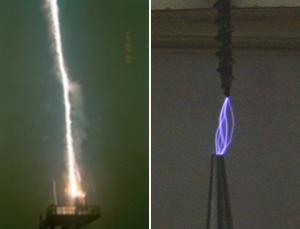Our research group has a strong interest in both chemical education research and curriculum development. We seek to understand student learning in the laboratory and classroom, specifically for learning chemistry and nanotechnology at the college level. Current projects involve the use of virtual worlds in the laboratory, development of new lab experiments that teach students about nanotechnology, and the learning centeredness of the physical chemistry course syllabus. We are also interested in the use of gamification in the chemistry classroom. We have completed our study of research-inspired chemistry lab projects for first-year students.
Contact Dr. W or talk with any members of our research group to learn more about these exciting projects.
Active Education Projects
Virtual Laboratory Experiences We seek a greater understanding of how the laboratory environment affect students’ learning and attitudes about chemistry. Thanks to advances in technology, students can conduct realistic lab experiments in a virtual reality (VR) or an augmented reality (AR) laboratory setting. Situated cognition theory suggests that learning is, in part, tied to the student’s physical environment but what does that mean when the laboratory is virtual? Researchers are just beginning to answer this question. The image on the right shows the virtual chemistry laboratory room that students use in Second Life.
We seek a greater understanding of how the laboratory environment affect students’ learning and attitudes about chemistry. Thanks to advances in technology, students can conduct realistic lab experiments in a virtual reality (VR) or an augmented reality (AR) laboratory setting. Situated cognition theory suggests that learning is, in part, tied to the student’s physical environment but what does that mean when the laboratory is virtual? Researchers are just beginning to answer this question. The image on the right shows the virtual chemistry laboratory room that students use in Second Life.
Our latest article about this topic is found here. My collaborator, Dr. Wendy Keeney-Kennicutt of Texas A&M, provided a great explanation of our work on an episode of the Drax Files.
We are interested in exploring learning in virtual worlds in different ways. Students can perform virtual lab experiments using computer software provided by textbook publishers and other vendors. Such software is promoted as a useful pre-lab exercise that the student performs prior to the real world lab session but a growing body of research is demonstrating that the activities are useful as a full substitute for hands-on experiments. At the other end of the spectrum, we are also interested in pursuing the development of fully immersive VR activities for chemistry lab students, keeping in mind that current VR technology is not cheap so a VR lab experience is not accessible to every student.
Novel Nanotechnology Laboratory Experiments
To prepare science and engineering students for their eventual careers, it is imperative that they learn about cutting edge research in chemistry and nanotechnology. This requires educators to adapt the latest published research experiments to a more student-friendly lab or classroom experience. My group collaborates with faculty in other departments in order to create a curriculum introductory nanotechnology courses and the general chemistry lab. Our latest experiment, developed to teach students about the toxicity of nanoparticles, can be found here. That experiment and many others grow out of our group’s chemical research interests.
Learning Centeredness of the Physical Chemistry Syllabus
We are particularly interested in how the Covid-19 pandemic and the associated shift to and from online education affected the physical chemistry syllabus.. We see changes in the learning-focus that might be attributed to the transition to remote instruction. These findings allow us to make specific recommendations to physical chemistry instructors for simple and practical changes that increase the learning focus of this important document. Our recommendations are based on the results of our analysis of the learning-centeredness of current physical chemistry syllabi and the existing literature on effective syllabus construction.
Gamification of Chemistry Lecture Classes
Motivation is a one important factor that contributes to students’ success in college. While educators should create a learning environment that promotes intrinsic motivation among students, external rewards can be effective as well. “Gamification” in education refers to creating a game-like structure in a course through the use of features common to video games, such as leader boards and badges. While gamification has shown some benefits to students’ learning in college courses, no studies have been performed among chemistry students. In addition, motivation is only one aspect of a course structure. I am interested in understanding how the effectiveness of gamification elements depends on other aspects of the course, such as the extent that students actively engage in learning or listen to lectures.
Completed Education Projects
Research-Inspired Projects in the General Chemistry Lab
Research projects conducted by faculty in STEM departments served as the inspiration for a new curriculum of inquiry-based, multiweek laboratory modules in the General Chemistry 1 course at Florida Tech. The purpose of this curriculum redesign was to improve students’ attitudes about chemistry as well as their self-efficacy and skills in performing inquiry activities. Students’ ability to plan experiments and interpret data improved throughout the semester, as did their confidence in conducting research-like lab activities. Improved confidence was observed among men and women, science and engineering students, and Caucasian and international students. These outcomes are similar to those found with authentic research-based experiments. The curriculum had less of an impact on students’ attitudes about chemistry. A research-inspired curriculum offers many benefits to students without the difficulties of designing actual research-based projects for general chemistry classes. (Link to published article)
 To the right is an example of a general chemistry lab project inspired by lightning research conducted by Florida Tech faculty. Students used a spark from a Tesla coil (right image) to simulate conditions that cause chemical reactions in actual lightning (left image). (Link to published article)
To the right is an example of a general chemistry lab project inspired by lightning research conducted by Florida Tech faculty. Students used a spark from a Tesla coil (right image) to simulate conditions that cause chemical reactions in actual lightning (left image). (Link to published article)